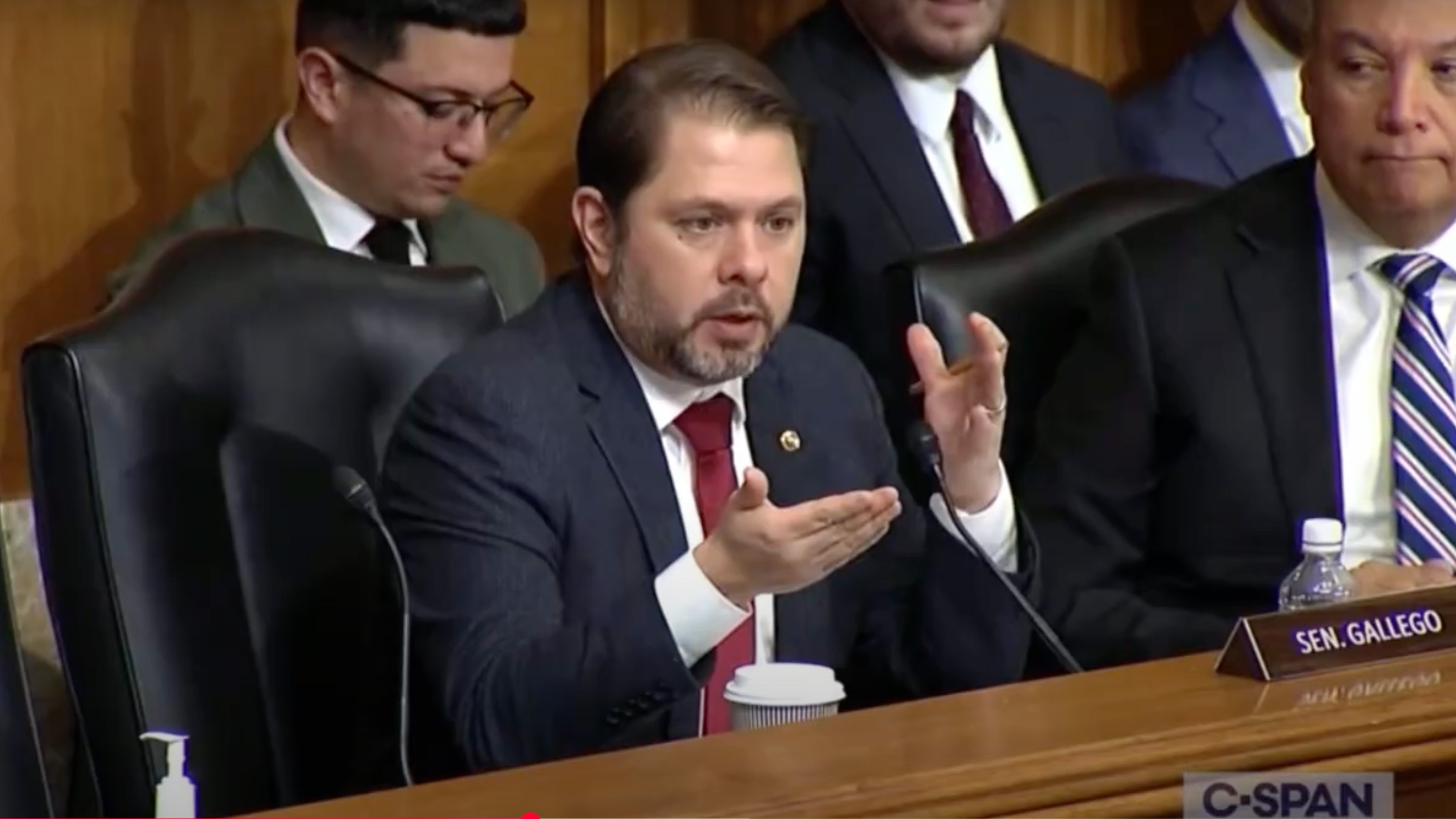 Arizona Senator Ruben Gallego questions Secretary of Energy nominee Chris Wright, during a confirmation hearing held by the Senate Committee on Energy and Natural Resources, Wednesday, Jan. 15, 2024.
Arizona Senator Ruben Gallego questions Secretary of Energy nominee Chris Wright, during a confirmation hearing held by the Senate Committee on Energy and Natural Resources, Wednesday, Jan. 15, 2024.
By Rebecca Santana, Associated Press
Democratic Arizona Sen. Ruben Gallego is wading into one of Washington's most contentious and intractable political problems as he puts forward a plan Monday aimed at reforming the country's immigration system and beefing up border security.
The plan by Gallego, who beat Republican Kari Lake in last fall's tight Senate race, calls for hiring more Border Patrol agents; using technology to stop fentanyl smuggling; reforming the asylum system; adding more ways for people to come to the U.S.; and a pathway to citizenship for some immigrants.
Gallego's plan comes three months into President Donald Trump's administration as Trump seeks to deliver on campaign promises of carrying out mass deportations. His plan — or any other from Democrats — is unlikely to get much traction with Trump in the White House, but it illustrates that the debate about legislative solutions carries on.
Many members of Congress have tried and failed to change the immigration system. A small group of senators, led by Gallego's predecessor, Krysten Sinema, negotiated for months in 2023 and 2024 over a border bill that would have toughened asylum protocols for migrants arriving at the U.S.-Mexico border; hired more officers to evaluate asylum claims and Border Patrol agents; and given money to local governments seeing influxes of migrants.
That effort ran into a wall of opposition just hours after the bill was released.
The last time Congress even came close to a breakthrough on immigration reform was in 2013, when a bipartisan group of senators pushed forward legislation creating a pathway to citizenship for millions of people in the country illegally and expanding work visas while tightening border security and mandating that employers verify workers’ legal status. The Senate approved that proposal, but it was rejected by the House.
Gallego's plan includes some elements that likely will find bipartisan support, such as his calls to beef up border security. But other parts — like efforts to legalize anyone already in the country illegally — will prove much more contentious.
“We don’t have to choose between border security and immigration reform. We can and should do both," Gallego said in a news release Monday. He said “for decades, Congress has tried and failed to take action because politics got in the way. It’s time to push forward and enact a plan that works.”
Gallego, a Marine Corps veteran who served in Iraq, replaced Sinema, a Democrat-turned Independent from Arizona who often was on the forefront on immigration and border security legislation.
Here's a look at the 21-page plan:
It offers more ways to get to the United States
Gallego argues that tougher immigration enforcement alone isn’t the answer and that it should be paired with more ways for people to come to the U.S. legally.
The plan calls for increasing the annual allotment of some visas and Green Cards and removing or significantly increasing “arbitrary per-country caps.” He also wants to create new visa categories, boost refugee resettlement and expedite the naturalization process for immigrants who serve in the military.
He also calls for gradually implementing E-Verify, which makes it easy to check if potential employees can legally work in the U.S. E-Verify has often faced resistance over concerns it would lead to widespread labor shortages.
It calls for a pathway to citizenship
Arguing on moral and economic grounds, Gallego calls for a pathway to citizenship for immigrants brought to the U.S. as children.
There’s no exact number of how many people this would encompass, although some estimates put the number as high as 3.4 million people.
Gallego’s plan also calls for a pathway to citizenship for spouses of U.S. citizens who are in the country illegally. President Joe Biden tried something similar last year in a program that would have covered an estimated 550,000 people, but it was swiftly held up by a judge.
It provides for investments in border security
Noting that migrant border arrivals started dropping back in June of last year, Gallego warns that a surge can come at any time so investments should be made now. The senator calls for better pay and addressing issues like workforce safety to help hire and retain Border Patrol agents; investments in technology and infrastructure to detect drugs or human smuggling; and focusing efforts of Immigration and Customs Enforcement on removing people who pose a safety threat.
Gallego, who often speaks about the toll of migrant surges on Arizona's border towns, also is proposing money to help affected communities.
It bolsters the asylum system
Instead of having asylum cases decided in backlogged immigration courts, Gallego wants to hire more asylum officers and give them the power to decide those cases. He also is proposing making the asylum standard higher and cutting back on asylum access during border surges.
It would look at root causes
Gallego argues the U.S. needs to figure out why migrants are leaving their home countries in the first place and address those problems.

By submitting your comments, you hereby give AZPM the right to post your comments and potentially use them in any other form of media operated by this institution.